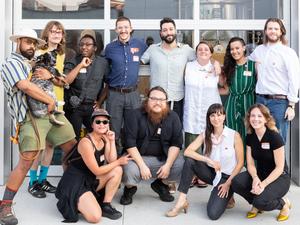
Independent musicians have a lot to think about when it comes to growing their careers in the ultra competitive industry — marketing their brands, growing social accounts, creating a logo, setting up shows and increasing streams on Spotify, just to name a few.
Doing all of these things while also focusing on the music component is no easy task, which is why most artists on the rise are typically forced to book a manager early on in their careers. It's a move that can run them $1,000 to $2,000 per month.
Now, a new company is trying to help independent artists grow their careers on their own — at least, until they feel they are big enough and actually ready for a manager.
Artist Republik is a decentralized networking platform for music businesses that allows independent music artists manage, market and book themselves, as well as grow their social profiles.
“A third of the music industry can’t afford a manager or marketer, but is really talented,” Artist Republik Founder Nicholas Cianfaglione told Rhode Island Inno. “They know where they want to go, but the industry deprives them of the resources they need because it’s set up to require you to have manager.”
The overall goal of Artist Republik is to help the “music middle class,” the independent artists making $50,000 to $60,000 per year, manage all of their responsibilities without having to pay the high monthly costs of a manager or marketer.
Cianfaglione, a Bryant University student, has been working in the music industry since he was in high school, hosting concerts and doing marketing for independent artists.
“Our main goal is to better manage the day-to-day and consistent growth of artists. It’s definitely going to be disruptive, I can say that.”
After working with more than 500 clients, Cianfaglione started to really learn the industry inside and out, from an artist’s perspective.
Who had a manager? Who didn’t? Why didn’t they have a manager? Who had an electronic press kit? Who was having trouble booking shows? How were they booking shows? Were they getting ripped off on show sales? Were they doing it themselves? Were they hiring someone?
He considered starting his own agency, but realized it would be too labor intensive.
A mentor of his suggested he automate everything, and it was an idea that stuck. Excited by the concept of building such a platform, Cianfaglione teamed up with fellow student Emil Jimenez to help him with the tech side of the business.
“We are not trying to replace the industry,” said Cianfaglione, adding that ideally the company will release data that will help large record labels and managers scout new and promising musicians. “An artist wants a manager. An artist wants a booking agent. But they want it when they succeed.”
The Artist Repulik platform helps bridge that gap, with intuitive functions such as helping artists set up shows and book venues.
But then there are a host of other tools that are much more complex. For instance, the platform will incorporate a REP score that uses an algorithm to show how much engagement an artist is receiving. So, if an artist gets a bunch of likes on a post on Instagram or more streams on Spotify, their REP score will go up. But if that artist is getting bad reviews or spamming people on Twitter, that score will go down.
The score's goal, according to Cianfaglione, is to give independent artists a number to quantify their success.
Other tools Artist Republik is incorporating include messaging so artists can connect with one another; a Spotify growth manager; a tool that can predict where artists should host tours and venues; and what Cianfaglione says is the first open-service marketplace in the music industry.
This marketplace will be a place that playlisters, graphic designers, music studios and vendors can buy and sell their services.
“We are allowing people to set their own prices because in the music industry everything is controlled,” said Cianfaglione. “We want to put everyone in one marketplace, let them see one another’s prices and see what happens.”
The platform is free for artists to use, but will make money by taking a small fee on transactions such as ticket sales and deals made in the marketplace. Cianfaglione said the company is also planning to do some limited advertising and potentially offer some freemium features as well.
A public beta version of Artist Republik was rolled out on Jan. 10, with a full release planned in March at the SXSW conference in Austin (the Artist Republik team was invited to the event).
While the platform is still new, it has already built up a huge following, boasting 40,000 followers on Facebook and an 11,000 person waiting list.
Cianfaglione sees plenty of market potential down the road, especially considering that the independent artist industry grew 35% since 2017. He also said the company is seeing a lot of interest from artists in India and Africa, two of the fastest growing music markets in the world.
“Our main goal is to better manage the day-to-day and consistent growth of artists,” he said. “It’s definitely going to be disruptive, I can say that.”








